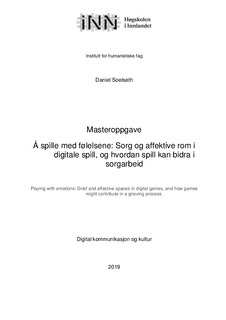| dc.contributor.author | Soelseth, Daniel | |
| dc.date.accessioned | 2019-11-18T09:57:13Z | |
| dc.date.available | 2019-11-18T09:57:13Z | |
| dc.date.issued | 2019 | |
| dc.identifier.uri | http://hdl.handle.net/11250/2628934 | |
| dc.description | Mastergradsoppgave i digital kommunikasjon og kultur, Høgskolen i Innlandet, 2019. | nb_NO |
| dc.description.abstract | Norsk:
Denne masteroppgaven søker å svare på hvordan de fire digitale spillene Oxenfree, Fragments of Him, That Dragon, Cancer og Life is Strange: Before the Storm kan skape affektive rom relatert til sorg og død, hva det er ved spill som gjør disse rommene mulig, og hvorvidt spillmediet kan inngå i et sorgarbeid. Oppgaven bygger på en mediespesifikk affektteoretisk tilnærming, der jeg forsøker å besvare hvordan spillene skaper affektive rom med utgangspunkt i trekk som er spesifikke for spillmediet. Oppgaven finner at spillene har litterære trekk som gjør at de framhever det narratologiske, og at et fravær av temporale begrensninger og ludiske trekk gir rom for ettertanke der de affektive rommene kan anerkjennes. Spillene etablerer muligheter for affektive rom gjennom en kombinasjon av interaktive og inderlige kommunikasjonsformer som dialoger, personlige brev og fotografier, så vel som hukommelsen og minnene som en impulskilde for karakterenes emosjoner. Gjennom å skildre brede og varierte emosjoner, så vel som refleksjoner rundt disse følelsene, legger spillene til rette for mulig gjenkjennelse og en erkjennelse av egne følelser. Spillene framhever seg selv som spill som skal spilles for å oppleves, og trekker oppmerksomheten til spilleren mot de narratologiske og estetiske sidene ved seg. | nb_NO |
| dc.description.abstract | English:
This thesis seeks to explore how the four digital games, Oxenfree, Fragments of Him, That Dragon, Cancer, and Life is Strange: Before the Storm can establish affective spaces related to grief and death, what aspects of the games that make these spaces possible, and in what way digital games as a medium could contribute in a process of grief. The theoretical framework of this thesis is a media-specific approach to affect theory, and it seeks to explain how the games establish possible affective spaces through aspects and traits specific for the medium. The thesis finds that the games has literary aspects which foregrounds the narratological experience, and the lack of temporal limitations and ludic elements gives room for afterthought and recognition of the affective impulses. The games establish possibilities for affective spaces through a combination of interactive and personal mediums of communication like dialogues, personal letters and photographs, as well as the memories as a source of emotional impulse in the characters. By representing a broad variety of emotions, as well as personal reflections of these, the games make possible a recognition and understanding of the player’s own emotions. The games foreground the fact that they’re meant to be played for the experience, and as such pulls the attention of the player towards the narratological and aesthetic. | nb_NO |
| dc.language.iso | nob | nb_NO |
| dc.subject | DIGKOM | nb_NO |
| dc.subject | sorg | nb_NO |
| dc.subject | sorgarbeid | nb_NO |
| dc.subject | spill | nb_NO |
| dc.subject | digitale spill | nb_NO |
| dc.subject | affektive rom | nb_NO |
| dc.title | Å spille med følelsene: Sorg og affektive rom i digitale spill, og hvordan spill kan bidra i sorgarbeid | nb_NO |
| dc.title.alternative | Playing with emotions: Grief and affective spaces in digital games, and how games might contribute in a grieving process. | nb_NO |
| dc.type | Master thesis | nb_NO |
| dc.source.pagenumber | 111 | nb_NO |
